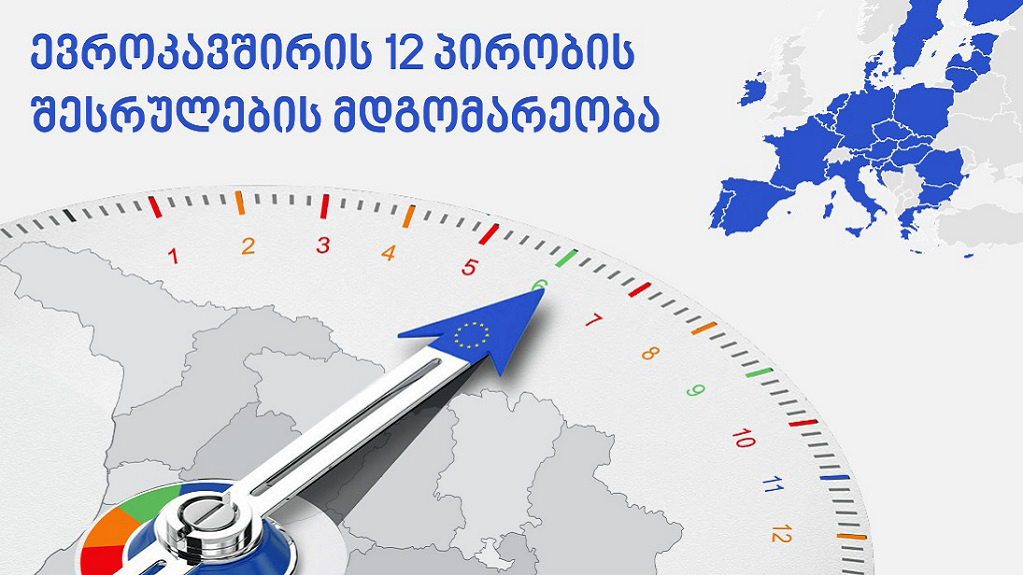According to the assessment of non-governmental organizations, of the 12 conditions defined by the European Commission for granting the status of a candidate for EU membership to Georgia, at the moment, only one, which refers to the consideration of the decisions of the European Court of Human Rights by the Georgian courts, has been fully satisfied.
News
Five requirements must be ticked - depolarization, an independent judiciary, de-oligarchization, freedom of the media, and the involvement of civil society in the process of fulfilling the conditions.
According to the report of nongovernmental organizations, among the expectations regarding depolarization are the reduction of the electoral threshold to 2% for the upcoming 2024 elections, the release of Nika Gvaramia, the director of the Mtavari Channel, the transfer of ex-president Mikheil Saakashvili to a hospital abroad for qualified treatment, Stopping hostile rhetoric from Georgian Dream and the opposition and ending hostile rhetoric against the civil sector and bullying of independent media. All these issues remain a challenge to this day. NGOs point out that political polarization between the government and the opposition, the government and the media, and the government and civil society has increased.
Non-governmental organizations in the independent judiciary state that the Parliament of Georgia has not yet elected non-judge members of the Supreme Council of Justice, and the draft law submitted to the Parliament does not include the reform of the Supreme Council. In addition, the constitutional amendments on the election of the Prosecutor General with a high quorum have been adopted with only one hearing.
NGOs believe that de-oligarchization can be achieved by implementing other recommendations. They remark that Georgian Dream passed the draft law on de-oligarchization in two hearings, although the European Union did not request a legislative regulation of de-oligarchization. Among the challenges outlined in the report is the approach of the Georgian Dream that the law on de-oligarchization will only apply to backers of critical media and opposition parties, but will not affect Bidzina Ivanishvili.
The primary challenges related to the freedom of the press are the imprisonment of Nika Gvaramia and the upholding of the guilty verdict against the founder of the TV company Pirveli by the Court of Appeal. The dispute against Davit Kezerashvili, the founder of the Formula TV channel, creates danger of loss of editorial independence of Formula, the impunity of the instigators of the July 5 violence, failure to investigate the facts of illegal wiretapping of journalists, biased interpretation of the European directive on audiovisual media services by Georgian Dream and adoption of flawed legislative amendments, which goes beyond the requirements of the European directive to the detriment of media freedom. NGOs point out that the Speaker of the Parliament issued an order to approve the procedure for the accreditation of mass media representatives in the Parliament, which violates and prevents the media's right to freely operate within the parliament.
The fifth unfulfilled recommendation concerns the involvement of civil society in the implementation of the 12 recommendations. According to the report, most of the civil society's recommendations regarding the Public Defender candidates, court reform, anti-corruption measures, democratic oversight, media, and vulnerable groups were not considered. In addition, Georgian Dream blocked the participation of Fair Elections (ISFED) in the working group on election issues. The report mentions that despite dropping the so-called agents' law, Georgian Dream continued its attacks on the civil sector and intensified its discrediting campaign:
"Despite dropping the law following public outcry, the leaders of Georgian Dream call public organizations agents of foreign influence. The civil sector is also accused of hindering the European integration process, organizing provocations, and destructive activities, and wanting to involve Georgia in the war against Russia. Also, their finances and loyalty to the country are being questioned."
Two recommendations related to the fight against organized crime and gender equality are considered largely implemented. Among the four partially adopted recommendations are electoral and institutional reforms, anti-corruption measures, protection of vulnerable groups, and the appointment of an independent public defender.
“Until the end of the year, the government and society still have time to fast-track the fulfillment of these conditions and, most importantly, to show a united will. Maybe not all conditions will be fully satisfied by October, but progress can be demonstrated. For this, first of all, the government should show sufficient political will,” says Keti Khutsishvili, executive director of the Open Society Foundation.
The implementation of the 12 recommendations of the European Commission was evaluated by the following nine non-governmental organizations: Open Society Foundation, Democracy Research Institute, Court Watch, Democratic Initiative of Georgia, Georgian Strategy and International Relations Research Foundation, Governance Monitoring Center, Georgia Reforms Association, and Partnership for Human Rights, Safari.















